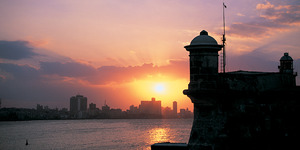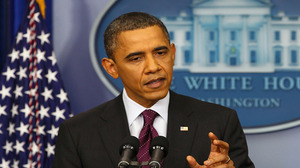After 53 years of not talking to each other, the United States and Cuba once again will resume full diplomatic relations. The official starting date for the new action has not been announced but is expected to be made in the next 11 days. Secretary of State John Kerry is the point man on the deal.
Diplomatic relations between the United States and Cuba were severed in January 1961 after the rise of Fidel Castro and his Communist government. Fidel, in his 80s, is still alive and the Cuban government remains Communistic. Raul Castro is Fidel's brother. Fidel no longer officially speaks for his government.
The planned U.S.-Cuban deal, however, does not end the import-export embargo that has existed between the two countries for five decades. Only the U.S. Congress can vote to end the embargo. Cuba is only 90 nautical miles south of Miami.
The Congressional vote on the embargo, a sore point with Cuba for the last half century, is not expected until the Republican Party commands both the House and Senate in early 2015. But the diplomatic relations deal puts the GOP squarely on the hot seat in the coming weeks and months. They have to show their real stripes or forget forever trying to get back into the White House in the 2016 election.
The historic joint announcement by President Barack Obama and Cuba President Raul Castro was made public Tuesday Dec. 16 after a 45-minute telephone conversation between the two leaders. Obama engineered the deal, using his Executive Authority power, without having to consult the Congress. His second four-year term ends at the end of 2016.
"These 50 years have shown that isolation has not worked," Obama said in a nationally televised White House statement. "It's time for a new approach."
However, Obama said he continues to be troubled by Cuba's human rights record but didn't think the current American policy toward the island nation was changing Cuba's position on human rights.
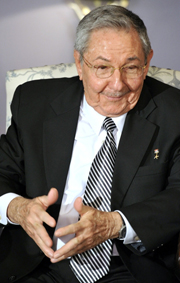
Raul Castro
The deal was brokered largely by Canada and supported by Pope Francis who hosted a final meeting at the Vatican. The deal was done in secret over 18 months.
The deal was triggered by the release of three Cubans imprisoned as spies in the U.S. since 2001and by the release of an unnamed American accused of spying in Cuba and in prison for 20 years.
Castro also agreed to release from Cuban jails 53 Cuban prisoners identified by the U.S. as political prisoners.
At the same time, but not considered part of the prisoner exchange deal by Obama and Castro, 65-year-old U.S. government telephone equipment contractor Alan P. Gross of Dallas, TX, reported to be in failing health, was also released from a Cuban prison after five years of detention.
When he was arrested in 2009, Gross was in Cuba to deliver satellite telephone equipment capable of cloaking connections to the Internet. The Cuban authorities, who tightly control access to the Internet in their country, initially said he was a spy. A Cuban court convicted him of bringing in the devices without a permit as part of a subversive plot, the court ruled, to "destroy the revolution."
The American government has spent $264 million over the last 18 years, much of it through its Development Agency, in an effort to spur democratic change in Cuba. The agency said in November that it would cease the kinds of operations that Gross was involved in when he was arrested.
The agency said at the time it would also stop allowing contractors to set up a Twitter-like social network that hid its ties to the United States government.
Here is what the U.S.-Cuba deal does:
- Re-open a U.S. embassy in Havana for the first time in a half century.
- Remove Cuba from the list of states that sponsor terrorism, a list it has been on since 1982.
- Start talks on Cuban-American migration.
- Begin working with Cuba on counter-narcotics strategy, environmental protection and human trafficking.
- Increase the amount of money Americans can send to Cubans from $500 to $2,000 every three months.
- Intermediaries forwarding remittances will no longer require a specific license from the government.
- Ease travel restrictions across all 12 categories, including family visits, official visits and journalistic, professional, educational and religious activities, and public performances.
- Ordinary tourism, however, will remain prohibited until later negotiations between the two countries.
- Licensed American travelers to Cuba will now be able to return to the U.S. with $400 in Cuban goods, including tobacco and alcohol products worth less than $100 combined. This means the long-standing ban on importing Cuban cigars is over, although there are still limits.
The three Cubans released in exchange for the American spy are part of the Cuban Five -- a group of men who were part of the "Wasp Network" sent by Cuba's then-President Fidel Castro to spy in South Florida.
The men, who are hailed as heroes in Cuba, were convicted in 2001 in Miami on charges including conspiracy and failure to register as foreign agents in the U.S. Two of the five were previously released after finishing their sentences.
Three members of Congress were on the plane that picked up Gross in Cuba on Wednesday and accompanied him back to the United States. They were Senator Patrick J. Leahy, Democrat of Vermont, Senator Jeff Flake, Republican of Arizona, and Representative Chris Van Hollen, Democrat of Maryland.
Other Democratic and Republican lawmakers were sharply critical of the deal.
"Let's be clear, this was not a 'humanitarian' act by the Castro regime," said Senator Robert Menendez, Democrat of New Jersey and the former chairman of the Foreign Relations Committee. "It was a swap of convicted spies for an innocent American. President Obama's actions have vindicated the brutal behavior of the Cuban government."
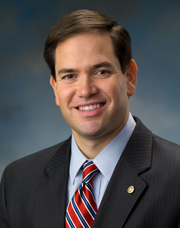
Senator Marco Rubio
The Rev. Jesse Jackson, Bill Richardson, the former New Mexico governor and cabinet secretary, and several members of Congress had appealed for Gross's release, along with Jewish advocacy groups in the United States.

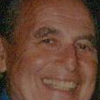 By
By 